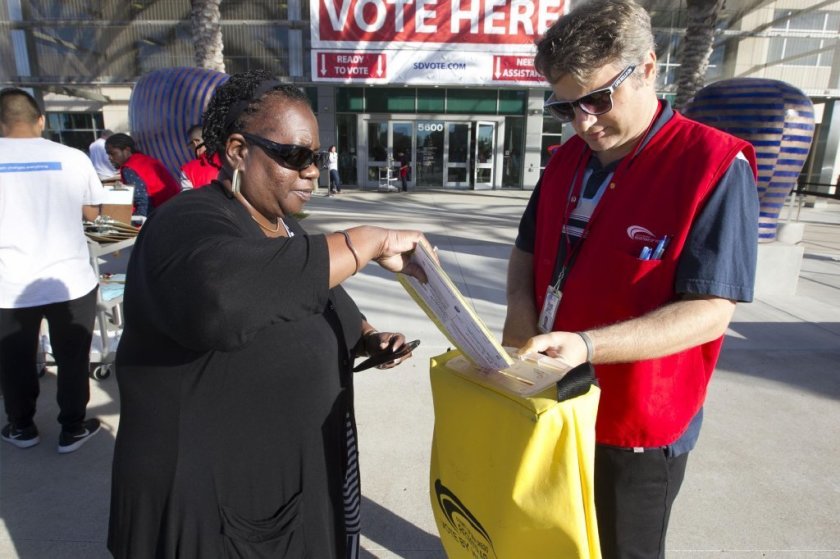What is ‘ballot harvesting’ and how was it used in California elections?

(JOHN GIBBINS / San Diego Union-Tribune)
In the wake of last month’s blue wave that wrested control of the House from Republicans and transferred it to the Democratic Party, some members of the GOP are complaining about the results and and the practice of so-called “ballot harvesting” in California.
In the most high-profile example, House Speaker Paul Ryan, R-Wisconsin, said last week that California “defies logic” and that he “can’t begin to understand what ‘ballot harvesting’ is.”
Podcast: Jimmie Slack lifts veil on San Diego City Hall inner workings
What is it, and why should you know? Read on, but first some context as the question is not unique to California.
The issue of “ballot harvesting” also captured the media spotlight this week in North Carolina where the practice is not allowed — and where the results of its 9th Congressional District race are under scrutiny in light of allegations of election fraud, The Washington Post has reported.
North Carolina’s State Board of Elections is now investigating those allegations. But the practice of so-called “ballot harvesting” itself is not illegal. Here’s a point-by-point explanation of why it is legal and how it worked in California, and whether it played a role in Democrats flipping historically Republican districts.
What is ‘ballot harvesting’?
“Ballot harvesting” is political jargon for a practice in which organized workers or volunteers collect absentee ballots from certain voters and drop them off at a polling place or election office. Coined by California Republicans, the term carries a negative connotation to suggest improprieties and even election fraud. The conservative site Townhall.com called it the California Democrats’ “latest election-stealing tool.” The San Francisco Chronicle Editorial Board took a different view, calling it “a sinister-sounding way of saying their opponents turned out more votes than they did” in one recent editorial.
Is it legal?
Yes.
In 2016, Gov. Jerry Brown signed into law a change to Section 3017 of the Election Code that allows any person to collect a mail-in ballot from voters and turn in the mail ballot to a polling place or the registrar’s office. Prior law restricted the practice to just relatives of or those living in the same household as the voter.
While critics decry it as the practice of a “banana republic,” proponents of the change say it allows more eligible citizens to participate in elections across California. Here’s how the legislation spells out the practice:
(a) All vote by mail ballots cast under this division shall be voted on or before the day of the election. After marking the ballot, the vote by mail voter shall do any of the following: (1) return the ballot by mail or in person to the elections official from whom it came, (2) return the ballot in person to a member of a precinct board at a polling place within the jurisdiction, or (3) return the ballot to the elections official from whom it came at a vote by mail ballot drop-off location, if provided pursuant to Section 3025. However, a vote by mail voter who is unable to return the ballot may designate any person to return the ballot to the elections official from whom it came or to the precinct board at a polling place within the jurisdiction. The ballot must, however, be received by either the elections official from whom it came or the precinct board before the close of the polls on election day.
Did ‘ballot harvesting’ take place in California’s elections?
Anecdotally, news reports have so far identified one county where the practice was noticed. Orange County’s registrar of voters, Neal Kelley, told the San Francisco Chronicle that the county “certainly had that going on here, with people dropping off maybe 100 or 200 ballots. Fred Whitaker, the chairman of the Republican Party in Orange County, told supporters that GOP losses in the county were the “direct result of ballot harvesting allowed under California law for the first time,” the Chronicle reported.
Did ‘ballot harvesting’ amount to election fraud in California?
There have been no credible reports of “ballot harvesting” being employed illegally or systematically to amount to election fraud. The Associated Press reported that Democrats have scoffed at theories of election fraud, and Secretary of State Alex Padilla was quoted saying that the laws don’t benefit one party over another.
So did ‘ballot harvesting’ help Democrats win big?
While Ryan’s comments indicate Republicans outside California were caught off guard by the practice, those inside the state said they were not surprised and some even commended Democrats.
“To say we were caught flat-footed by this is just not true,” California GOP spokesman Matt Fleming told Fox News. “We were well aware of this, we even did it ourselves, we pay attention to election laws.”
Dale Neugebauer, a veteran Republican consultant, told the Chronicle that Democrats used the practice in a “thorough and disciplined” ground game.
“Absolutely, ballot harvesting played a very significant role,” Neugebauer told the Chronicle, adding that “I have a little bit of professional admiration for how well the Democrats executed their plan.”
Correction: An earlier version of this story incorrectly said “ballot harvesting” is allowed in North Carolina.